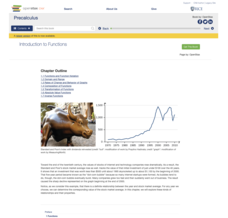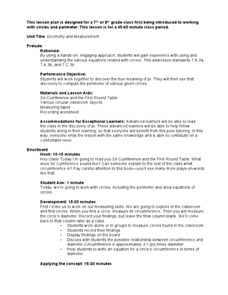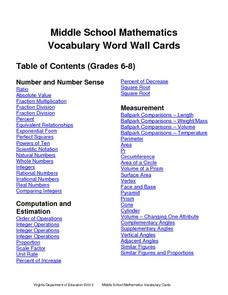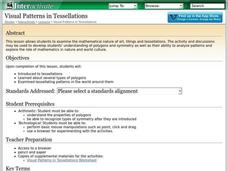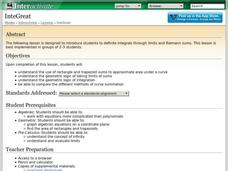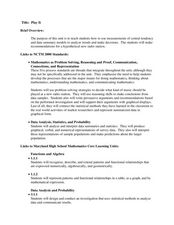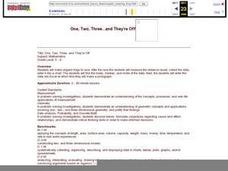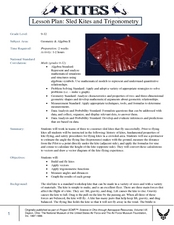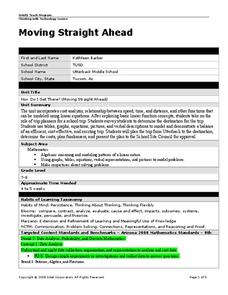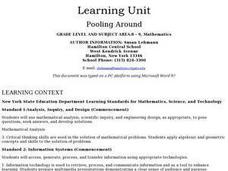Rice University
Precalculus
Take a step beyond Algebra 2. Learners use the eBook to learn concepts from the typical Precalculus course. Content starts off with a short review of functions in general and moves on to the basic functions, finishing up with more...
Curated OER
Creating The Virtual Model
Students engage in a lesson that is about the concept of earthquake design. The lesson includes the integration of technology and how it can be used to create buildings and structures for withstanding an earthquake. Students also define...
Curated OER
Scale Me Down
Students create scale drawings, and ultimately scale models, of real-world objects in this Math lesson about ratios, proportion, scaling factors, and cross products. The lesson includes ideas for cross-curricular extensions and is...
Curated OER
Geometry and Measurement
Students view a right triangle displayed by the teacher. Students measure legs and the interior angles of the triangle. They look for a pattern or relationship between the legs and angles. Students use pegboards and string to create more...
Virginia Department of Education
Middle School Mathematics Vocabulary Word Wall Cards
Having a good working knowledge of math vocabulary is so important for learners as they progress through different levels of mathematical learning. Here is 125 pages worth of wonderfully constructed vocabulary and concept review cards....
Shodor Education Foundation
Visual Patterns in Tessellations
Geometers explore the concept of tessellations. They use a tessellation applet to manipulate shapes and design their own tessellation using the applet.
Shodor Education Foundation
InteGreat
Hands-on investigation of Riemann sums becomes possible without intensive arithmetic gymnastics with this interactive lesson plan. Learners manipulate online graphing tools to develop and test theories about right, left, and midpoint...
College Board
Why Variances Add - And Why It Matters
Why is adding variance important? A lesson outline defines a variance theorem and how it affects the data statistics. The instruction shows scholars the importance of considering the variance of data and why it requires independence.
Inside Mathematics
Snakes
Get a line on the snakes. The assessment task requires the class to determine the species of unknown snakes based upon collected data. Individuals analyze two scatter plots and determine the most likely species for five additional data...
NASA
Pop! Rockets
Off they go — launching rockets is fun. The lesson plan contains templates to build paper rockets that can be launched from a PVC pipe launcher. Individuals or groups build the rockets and determine the shapes for their fins. Included...
Inside Mathematics
Population
Population density, it is not all that it is plotted to be. Pupils analyze a scatter plot of population versus area for some of the states in the US. The class members respond to eight questions about the graph, specific points and...
Curated OER
Tessellations: Geometry and Symmetry
Learners explore the concept of tessellations. In this tessellations instructional activity, students use an applet to construct tessellations. Learners use regular polygons to construct tessellations. Students find patterns and symmetry...
Curated OER
Shaping Up!
Kindergartners are introduced to basic shapes. Learners spend 45 minutes a day in geometry centers carrying out the activities outlined in this ambitious plan. There are games, hands-on activities, interactive websites, art projects,...
Curated OER
Play It
There are a number of activities here that look at representing data in different ways. One activity, has young data analysts conduct a class survey regarding a new radio station, summarize a data set, and use central tendencies to...
Curated OER
Patterns Here, There, and Everywhere!
Upper graders access the Microsoft Word program and create patterns by utilizing certain keys on the keyboard. They create picket fences, smiley faces, and hearts. It seems that this lesson has as much to do with keyboarding skills as it...
Curated OER
One, Two, Three...and They're Off
Students make origami frogs to race. After the race they measure the distance raced, collect the data, enter it into a chart. They then find the mean, median, and mode of the data. Next, students enter this data into Excel at which time...
Curated OER
Picking Pythagoras
Students discover that side measurement is used in determining angle classification of a triangle. By squaring sides, they predict whether triangles be right, obtuse, or acute. They prove the Pythagorean Theorem and use it to solve...
Curated OER
Transformations
Tenth graders recognize, perform and derive rules for basic transformations including translation, reflection and rotation. They also consider compositions, a combination of two or more basic transformations. Students explore both...
Curated OER
Fractals and the Chaos Game
Students explore the concept of fractals. In this fractals lesson, students play the "Chaos Game" via an applet. Students place dots on the screen to recognize that they have created Sierpinski's Triangle.
Curated OER
The Mandelbrot Set
Students explore the concept of Mandelbrot sets and Julia sets. In this Mandelbrot and Julia set instructional activity, students use a function integrator applet to investigate two-variable function iterations. Students use Julia set...
Curated OER
Sled Kites and Trigonometry
Students study the history of kites and their fundamental properties. In this kites lesson students divide into teams and build and fly kites.
Curated OER
The Minimal Distance Point from the Vertices of a Triangle
Learners calculate the distance from the vertex of a triangle to the center. In this geometry lesson plan, students find the shortest distance between a point and the vertex of a triangle. They relate this concept of distance to the real...
Curated OER
Moving Straight Ahead
Students analyze the relationship between speed, time and distance. In this math lesson, students plan a school trip. Students determine the efficiency and cost effectiveness of a trip.
Curated OER
Pooling Around
Students complete a unit of lessons on computing area and volume. They play a Jeopardy game of basic area formulas, calculate surface area of shapes, develop a Powerpoint presentation, and conduct a simulation of finding the surface area...


